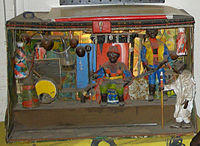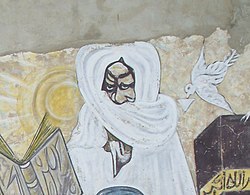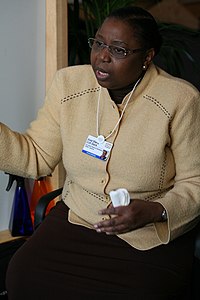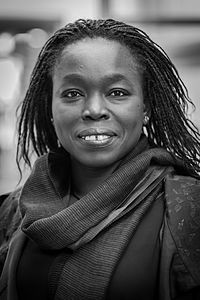| This page is currently inactive and is retained for historical reference. Either the page is no longer relevant or consensus on its purpose has become unclear. To revive discussion, seek broader input via a forum such as the village pump. |
Selected biography 1
Portal:Senegal/Selected biography/1

Léopold Sédar Senghor (9 October 1906 – 20 December 2001) was a Senegalese poet, politician, and cultural theorist who served as the first president of Senegal from 1960–1980. Senghor was the first African to sit as a member of the Académie française. He was also the founder of the political party called the Senegalese Democratic Bloc. He is regarded by many as one of the most important African intellectuals of the 20th Century.
Selected biography 2
Portal:Senegal/Selected biography/2

Cheikh Anta Diop (29 December 1923 – 7 February 1986) was a Senegalese historian, anthropologist, physicist, and politician who studied the human race's origins and pre-colonial African culture. Though Diop is sometimes referred to as an Afrocentrist, he predates the concept and thus was not himself an Afrocentric scholar. However, Diopian thought, as it is called, is paradigmatic to Afrocentricity. His work was greatly controversial and throughout his career, Diop argued that there was a shared cultural continuity across African peoples that was more important than the varied development of different ethnic groups shown by differences among languages and cultures over time.
Selected biography 3
Portal:Senegal/Selected biography/3

Kocc Barma Fall (1586 — 1655) was a Cayorian philosopher and a member of the lamanic class. Kocc Barma was an Ajoor-Ajoor - a Serer demonym, meaning an inhabitant of the Kingdom of Cayor, now part of present day Senegal. He is considered to be the greatest Senegalese thinker and philosopher and one of the prominent figures of African philosophy.
Selected biography 4
Portal:Senegal/Selected biography/4 Maad Ndaah Njemeh Joof is one of the patriarchs of the Joof family, himself the medieval King of Laah (or Lâ) in Baol now part of independent Senegal. He ruled from the late 13th century to the early 14th century, c. 1290. His descendants from the branch of Maad Patar Kholleh Joof (the conqueror) ruled the pre-colonial Kingdoms of Sine, Saloum and Baol, from the 14th century to 1969.
| ? | Maad Ndaah Njemeh Joof (King of Laa, Baol, c. 1290) | ||||||||||||||||||||||||
| Lingeer Mane Nyan Daughter of Sine o Mev Manneh (Guelowar) - whom the Kingdom of Sine is renamed after. | Maad Patar Kholleh Joof (The Conqueror) (King of Laa (Baol) and Teigne of Baol). Father of Jaraff Boureh Gnilane Joof (Jaraff and Prince of Sine) from his first marriage. | ||||||||||||||||||||||||
| Maad a Sinig Niokhobai Mane Nyan Joof Maad a Sinig (King of Sine) | Maad a Sinig Gejopal Mane Nyan Joof Maad a Sinig (King of Sine) | Lingeer Siga Pal Mane Nyan Joof Princess of Sine | |||||||||||||||||||||||
Selected biography 5
Portal:Senegal/Selected biography/5 Iba Der Thiam (born 26 February 1937 at Kaffrine) is a Senegalese writer, historian, and politician. He served in the government of Senegal as Minister of Education from 1983 to 1988; later, he was First Vice-President of the National Assembly of Senegal from 2001 to 2012.
Thiam became an Associate Professor of History at the University of Dakar in October 1974. He was imprisoned under President Léopold Sédar Senghor for attempting to organize the country's intellectuals. Under President Abdou Diouf, he served in the government as Minister of National Education from 1983 to 1988.
Selected biography 6
Portal:Senegal/Selected biography/6

Youssou N'Dour (French pronunciation: [jusu nduʁ]; born 1 October 1959) is a Senegalese singer, songwriter, composer, occasional actor, businessman, and politician. In 2004, Rolling Stone magazine described him as, "perhaps the most famous singer alive" in Senegal and much of Africa. From April 2012 to September 2013, he was Senegal's Minister of Tourism.
N'Dour helped develop a style of popular Senegalese music known by Senegambians as mbalax, a genre that have sacred origins in the njuup and ndut traditions of the Serer. He is the subject of the award-winning films Return to Gorée (2007) directed by Pierre-Yves Borgeaud and Youssou N'Dour: I Bring What I Love (2008) directed by Elizabeth Chai Vasarhelyi, which were released around the world.
Selected biography 7
Portal:Senegal/Selected biography/7 Lamane Jegan Joof (English spelling in the Gambia, or Lamane Djigan Diouf - French spelling in Senegal) was a Serer lamane, who according to Serer tradition founded Tukar now part of present-day Senegal. The Raan religious festival takes place each year at Tukar, two weeks after the appearance of the new moon in April. He is an early ancestor of the Joof family. Himself a member of the lamanic class and originally from Lamabaye.
Selected biography 8
Portal:Senegal/Selected biography/8

Sheikh Amadou Bamba Mbacke (1850–1927) was a Sufi saint (Wali) and religious leader in Senegal and the founder of the large Mouride Brotherhood (the Muridiyya).
Sheikh Amadou Bamba produced a prodigious quantity of poems and tracts on meditation, rituals, work, and Quranic study. He led a pacifist struggle against the French colonial empire while not waging outright war on the French like several prominent Tijani marabouts had done.
Selected biography 9
Portal:Senegal/Selected biography/9 War Jabi was the first Muslim king of Tekrur in the 1030s.
Selected biography 10
Portal:Senegal/Selected biography/10 Maad a Sinig Kumba Ndoffene Famak Joof (c. 1810 – 23 August 1871) was the King of Sine (Maad a Sinig) in modern-day Senegal. He ruled from 1853 until his assassination by the French on 23 August 1871. He was the son of Maad Souka Ndela Joof and Lingeer Gnilane Jogoy Joof. His father – Maad Souka Ndela came from The Royal House of Semou Njekeh Joof founded by Maad Semou Njekeh Joof in the early 18th century, which was the third and last Royal House of the Joof family of Sine and Saloum. His paternal family (the Joof family) ruled three Kingdoms : Sine, Saloum and previously Baol. They descended from Maad Ndaah Njemeh Joof the 13th century King of Lâ (Laah). During his reign, Kumba Ndoffene Famak was faced with two external forces: French colonialism and the Senegambian Muslim marabouts' jihadic expeditions to Islamize his country.
Kumba Ndoffene Famak resisted French colonialism which led to the Battle of Logandème in 1859. He also defeated the Muslim marabouts at the Battle of Fandane-Thiouthioune in 1867 and squelched the Muslim advance in Sine. It was in that battle that Maba Diakhou Bâ, leader of the Muslim marabouts at the time, lost his life.
Kumba Ndoffene Famak is the father of Lam Souka Mboul Joof (or Lam Souka Mboul Diouf), Prince and Lamane of Sine. He is also the father of Lingeer Selbeh Ndoffene Joof (or Selbé Ndoffène Diouf) - the Princess of Sine that was abducted and forcefully married off by the Muslim marabouts to one of Maba's brothers just before the Battle of Fandane-Thiouthioune. As a revenge attack for the abduction and forced marriage of his daughter, Maba's brother was castrated.
| Short genealogy of Maad a Sinig Kumba Ndoffene Famak Joof | |||||||||||||||||||||||||||||||||||||||||||||||||||||||||||||||||||||||||||||||||||||||||||||||||||||||||||||||||||||||||||||||||||||||||||||||||||||||||||||||||||||||||||||||||||||||||||||||||||||||||||||||||||||||||||||||||||||||||||||||||||||||||||||||||||||||||||||||||||||||||
|---|---|---|---|---|---|---|---|---|---|---|---|---|---|---|---|---|---|---|---|---|---|---|---|---|---|---|---|---|---|---|---|---|---|---|---|---|---|---|---|---|---|---|---|---|---|---|---|---|---|---|---|---|---|---|---|---|---|---|---|---|---|---|---|---|---|---|---|---|---|---|---|---|---|---|---|---|---|---|---|---|---|---|---|---|---|---|---|---|---|---|---|---|---|---|---|---|---|---|---|---|---|---|---|---|---|---|---|---|---|---|---|---|---|---|---|---|---|---|---|---|---|---|---|---|---|---|---|---|---|---|---|---|---|---|---|---|---|---|---|---|---|---|---|---|---|---|---|---|---|---|---|---|---|---|---|---|---|---|---|---|---|---|---|---|---|---|---|---|---|---|---|---|---|---|---|---|---|---|---|---|---|---|---|---|---|---|---|---|---|---|---|---|---|---|---|---|---|---|---|---|---|---|---|---|---|---|---|---|---|---|---|---|---|---|---|---|---|---|---|---|---|---|---|---|---|---|---|---|---|---|---|---|---|---|---|---|---|---|---|---|---|---|---|---|---|---|---|---|---|---|---|---|---|---|---|---|---|---|---|---|---|---|---|---|---|---|---|---|---|---|---|---|---|---|---|---|---|---|---|---|---|
| |||||||||||||||||||||||||||||||||||||||||||||||||||||||||||||||||||||||||||||||||||||||||||||||||||||||||||||||||||||||||||||||||||||||||||||||||||||||||||||||||||||||||||||||||||||||||||||||||||||||||||||||||||||||||||||||||||||||||||||||||||||||||||||||||||||||||||||||||||||||||
Selected biography 11
Portal:Senegal/Selected biography/11

Awa Marie Coll-Seck (born 1951 in Dakar, Senegal), is former Executive Director of The Roll Back Malaria (RBM) Partnership and is on the Board of Directors at the Program for Appropriate Technology in Health (PATH), Medicines for Malaria Venture (MMV), Innovative Vector Control Consortium (IVCC) et al.
After earning a degree in medicine in 1978 from the University of Dakar, Coll-Seck served for nearly twenty years as a specialist in infectious diseases in leading hospitals in Dakar, Senegal and Lyon, France. In 1989, she was appointed Professor of Medicine and Infectious Diseases at the University of Dakar and Chief of Service for Infectious Diseases at the University Hospital in Dakar.
Selected biography 12
Portal:Senegal/Selected biography/12

Fatou Diome (born 1968 in Niodior, Senegal) is a French-Seneglese writer known for her best-selling novel The Belly of the Atlantic, which was published in 2001. Her work explores immigrant life in France, and the relationship between France and Africa.
Selected biography 13
Portal:Senegal/Selected biography/13 Germaine Acogny (born 1944), is a Senegalese dancer and choreographer. She is responsible for developing "African Dance", as well as the creation of several dance schools in both France and Senegal. She has been decorated by both countries, including being an Officer of the Ordre des Arts et des Lettres in France, and a Knight of the National Order of the Lion.
Born in Benin in 1944 to a Senegalese civil servant, Germaine Acogny was also a descendant of the Yoruba people through her grandmother. When she was 10, the family moved to Dakar, Senegal, where she spent the remainder of her childhood. After showing a natural ability in dancing, she decided to pursue this as a career, moving to France in the 1960s to study modern dance and ballet.
Selected biography 14
Portal:Senegal/Selected biography/14 Yandé Codou Sène (or Yande Codou Sene) was a Senegalese singer from the Serer ethnic group. She was born in 1932 at Somb in the Sine-Saloum delta and died on 15 July 2010 at Gandiaye in Sénégal. She was the official griot of president Léopold Sédar Senghor. Most of her music is in the Serer language.
Yandé Codou sings in the old Serer tradition and have had a significant impact on Senegambian music as well as artists including Youssou N'Dour whom she has inspired immensely. Although she started singing from a very young age, she didn't record her first album until she was aged 65.
Selected biography 15
Portal:Senegal/Selected biography/15 Safi Faye (born November 22, 1943) is a Senegalese film director and ethnologist. She was the first Sub-Saharan African woman to direct a commercially distributed feature film, Kaddu Beykat, which was released in 1975. She has directed several documentary and fiction films focusing on rural life in Senegal.
Selected biography 16
Portal:Senegal/Selected biography/16

Blaise Diagne (13 October 1872 – 11 May 1934) was a Senegalese-French political leader and mayor of Dakar. He was the first black African elected to the French Chamber of Deputies, and the first to hold a position in the French government.
Born in Gorée to a Senegalese Lebu father — Niokhor Diagne — a cook and sailor, and a Manjack mother of Guinea-Bissau origin — Gnagna Anthony Preira. Diagne was adopted as a child by the Crespin family who were of mixed race origin from Gorée and St. Louis, and Christians. They baptised him as "Blaise". He studied in France before joining the French customs service in 1892. He served in Dahomey (modern day Benin), French Congo (now Republic of the Congo), Réunion, Madagascar, and French Guiana. In September 1899, while in Réunion, Diagne became a freemason, joining a lodge affiliated with the Grand Orient de France.
Selected biography 17
Portal:Senegal/Selected biography/17 Linguere Ndoye Demba Joos Fadiou, (fr: Linguère Ndoye Demba Diouss-Fadiou, also known as Ndoye Demba in Senegambian dynastic history, was a Serer princess of Sine (now part of present-day Senegal), from the later half of the 14th century to the 15th century. The royal title – "Lingeer" means Queen or Royal Princess. She was given in marriage to the Brak of Waalo – Caaka Mbaar Mbooj.
Caaka Mbaar was the second king of Waalo from the Mbooj patrilineage, who ruled in the second half of the 14th century, around 1367. Brak was the title of the kings of Waalo. Lingeer Ndoye Demba was the founder of the Serer Joos Maternal Dynasty of Waalo. In the Wolof Kingdom of Waalo, Lingeer Ndoye Demba is considered the matriarch of the Joos maternal clan. In the Serer Kingdom of Sine, it is her grandmother Lingeer Fatim Beye who is considered to be the matriarch of this maternal dynasty. In the Serer language, the word "Fa-tim" means "the maternal clan of ... ". The Serer surname Beye (var : Bèye) is also one of the many Serer maternal clans.
Lingeer Ndoye Demba's marriage to Brak Caaka Mbaar took place in the Sine (the country of her birth). She was given in marriage to the King of Waalo during his visit to Sine. After the marriage, she accompanied her husband to the Waalo where she received great hostility from the two established maternal clans : the Tedyek Maternal Dynasty (of Fula origin) and the Loggar Maternal Dynasty (of Moor origin). The king's mother was a Loggar and his first wife (Lingeer-Awo Yassin Tanor) was a Tedyek. These three maternal dynasties ruled the kingdom of Waalo with the Mbooj paternal family. For nearly six hundred years, these three maternal clans engaged in dynastic struggles among themselves. The Battle of Nder (or Ndeer) which is still remembered and celebrated in Waalo, began as a dynastic struggle between the Joos Maternal Dynasty (maternal descendants of Lingeer Ndoye Demba) and the Tedyek, where the Joos family massacred several members of the Tedyek clan.
The following is a brief genealogy of Linguere Ndoye Demba.
- Family of Lingeer Ndoye Demba
Lingeer Fatim Beye (From Kingdom of Sine, Princess Royal and Queen of Sine, matriarch of the Joos Maternal Dynasty of Waalo) │ Lingeer Ndoung Jein (Princess of Sine) │ │ _______________│ │ │ ┌───────────┴────────────────────────────────────────┐ Lingeer Fatim Malado │ Nancy Demba (Princess of Sine) │ (Princess of Sine) │ │ │______________________________________________________________________ │ │ Lamtoro Abraham Sall (of Futa Toro) │ │ │ │___________________________________________ │ │ │ ? = Lingeer Fatoumata Sall = Mbarick Bo │ (1) │ (2) │ ______________│ │ │ │ Brak Barka Bo = *Lingeer Faaduma Yumeyga │ │ (Barka Mbooj, King of Waalo) │______________________________________ │ │ │ │ Ndiadiane Ndiaye = Lingeer-Awo Maram Doye Gaye = Lingeer Mbat Mboye │ │ (King of Jolof, founder of the Jolof Empire) │ (1) (daughter of Amar Gaye) │ (*3) │ │ ___________________________│ │ │ │ │ Ware Ndiaye │ │ │ │ │ │ ___________________________________________│ │ │ │ ______________│ │ │ │ │ Brak Caaka Mbaar Mbooj = Lingeer Ndoye Demba ┌───────────┴────────────────────────────────────────┐ (King of Waalo) │ (From Kingdom of Sine) │ │ │ │ │ (Princess of Sine, Queen of Waalo) Sare Ndiaye Guet Ndiaye Ndombuur Ndiaye Guedo Ndiaye │ (2) (King of Jolof) ________________│ ┌───────────┴────────────────────────────────────────┐ │ │ Brak Yerim Mbanyik Ndoye Demba Mbooj Sodeh Mbooj (King of Waalo) │ │ _____________________________________________________________│ │ │ ┌───────────┴────────────────────────────────────────┐ Jummoul Diouroukh Baka Dequene = Aïssa │ │ ____________________________│ ________________│ ┌───────────┴────────────────────────────────────────┐ ┌───────────┴────────────────────────────────────────┐ │ │ │ │ │ │ │ │ │ │ Degene Mande Bo Mbody Fanta Degene Ko Khadj Yalladj Jaw Njuck Mbouneh Njuck Fary Njuck Borom Borom Mbooj Mbooj Mbooj Ndiouk │ │ Fa Mbooj Njaak
Selected biography 18
Portal:Senegal/Selected biography/18 Ngalandou Diouf (or Galandou Diouf) (14 September 1875 - 6 August 1941) born in Saint-Louis Senegal, was the first African elected official from the advent of colonialism in the territory of French West Africa.
Diouf was born to the aristocratic Diouf family. He was of Wolof and Serer background, and as a native of one of the Four Communes of Senegal considered part of France, was granted the (nominally) full rights of French citizenship. He began his career as a schoolteacher and minor government clerk but became progressively involved in politics.